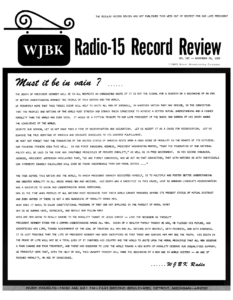 The Bill Gavin Newsletter / December 21, 1963
The Bill Gavin Newsletter / December 21, 1963
By BILL GAVIN
Billboard Contributing Editor
 DURING THE DAYS that followed President Kennedy’s death, I was privileged to talk with many people in radio, in many different cities. Without exception, they expressed shock, grief and even shame that such a thing could happen in the United States of America. Many spoke with pride of the manner in which their stations responded to the tragic events and of the loyal, unselfish cooperation of their program staffs.
DURING THE DAYS that followed President Kennedy’s death, I was privileged to talk with many people in radio, in many different cities. Without exception, they expressed shock, grief and even shame that such a thing could happen in the United States of America. Many spoke with pride of the manner in which their stations responded to the tragic events and of the loyal, unselfish cooperation of their program staffs.
All stations, of course, abandoned their regular formats of popular records, substituting different kinds of serious music. All advertising was canceled until the morning of Tuesday, November 26. Even after that date, many stations were cautiously slow in returning to their full complement of current hit records. In a few cases, it was reported that even though the regular playlist was once more in effect, disk jockeys simply would not program the more raucous sounds. The entire response of American radio during those difficult days was a mark of innate good taste and respect for listeners’ feelings on the part of radio people.

THE QUESTION has been asked by many – and answered by none: Will the sobering reflections of our national tragedy bring about a new trend in programming? Some things are fairly certain: shock wears off; memories of sorrow grow dim; time erodes the sharp edges of a newly aroused national con- science. It is a part of living that there should be music and laughter and entertainment. No one would want it otherwise. Radio Influences youth network television, and radio is doing an excellent job of presenting and explaining the world’s problems and our concern with them.
Unfortunately, very little of the networks’ news and commentaries ever reach the school age population. The majority of the teens and pre-teens prefers listening to pop radio. Pop records are its entertainment and disk jockeys are its heroes.

THERE ARE DISK JOCKEYS who claim to “identify” with teenagers. What some of them mean is that they accept and condone teen attitudes and behavior: What is implied is often the disk jockey’s apparent approval of the lowest common denominator of juvenile morality. The radio jock is the acknowledged leader in the field of records for youth; he too often neglects his opportunities to lead in the direction of more enduring values. Many radio stations, with their well -publicized “personalities,” are held in far higher esteem by their young listeners than are their schools, their churches, or even their homes.
It is time, I think, for such prestige to be used to reinforce, rather than to ignore, the basic values of human living. Isn’t it time that radio stood for something besides competition and profit?
_______________
A MCRFB Note: You can click over image(s) 2x for expanded, detailed PC view. Or tap over and “stretch” images across your mobile device’s screen for digitized view.
_______________
Information, credit and news source (as published): Billboard December 21, 1963
![]()











